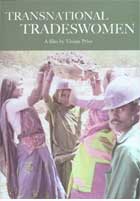
Transnational Tradeswomen 2006
Distributed by Women Make Movies, 462 Broadway, New York, NY 10013; 212-925-0606
Producer n/a
Directed by Vivian Price
DVD, color, 62 min.
Jr. High - Adult
Women's Studies, Business, Labor Studies, Asian Studies, Economics
Date Entered: 02/23/2007
Reviewed by Caron Knauer, La Guardia Community College, Long Island City, New YorkVivian Price, whose previous documentary, Hammering It Out (Women Make Movies, 2000), was about American women in the construction industry, is a former construction worker and electrician. Her latest film focuses on the changing view of women in the Asian construction industry, and its inherent sexual division of labor. Women have been for the most part relegated to unskilled helpers. She travels to Taiwan, Thailand, India, Singapore, and Japan, and conducts lively on-site interviews with both women and men. She interweaves these interviews with a richly contextualized narration filled with fascinating background details. Did you know that many of the 20,000 workers who built the Taj Mahal were women? I didn’t.
“Women have been doing heavy manual labor,” Price says, “for family and for community throughout history and during times of crisis in industrial times women often perform men’s jobs.” Price’s journey begins at the Beijing Conference on Women in 1995, where issues of sexism, oppression, safety, job training, and wages are being discussed. She learns that half of construction workers in India are women, although they most often have the unskilled jobs. Women help the masons, but they are not trained to be masons. Many women’s groups are doing grassroots organizing and fighting for the right to learn the skills, so they can make higher wages. She finds out that teenage boys on construction crews in Thailand are raping teenage girls, and the girls cannot defend themselves because they are in a contract with an employer. She travels to Thailand, and learns that when rice farming is difficult, whole families come to the city to follow construction jobs, and she films at a construction/living site. A Thai guy who doesn’t like the trend of women construction workers tells her, “It’s different for women to hit nails or take tiles up to the roof. Their hearts are not 100% courage.”
In Singapore, Price interviews an original Samsui woman who is now in her 90s. The Samsui, which means mountain and water, were Chinese immigrants, fiercely independent women, who worked alongside men doing menial construction work in the 1920s. They’re the Asian equivalent of Rosie the Riveters. Known for their signature red hats and refusal to marry, they’ve been celebrated in popular culture, most notably in a TV series and a ginger chicken recipe.
Price interviews two young Muslim Pakistani women working on a construction site in Lahore. The men scout out the jobs and collect the wages for the women, but the women work alongside the men. Price asks a man if the women are trained to do the work, and he responds, “Hunger is the best training. When one is hungry, one learns.”
An Indian woman tells Price that some progress is being made in terms of women becoming masons and forming unions. She says, “Things are changing, mind is also changing.” Price talks about the impact of privatization and globalization on the Asian economy, and concludes by attending an Indian union meeting where women are singing, “If women wake up, revolution is going to be easy. Form a union, sister.”
The archival film footage is compelling, and the pulsating third world music is evocative. Price is a fine filmmaker, and the editing is quite accomplished Transnational Tradeswomen is an important and inspiring film. To paraphrase Helen Reddy, I am woman, hear my saw!
Awards
- CINE Golden Eagle Award, 2006